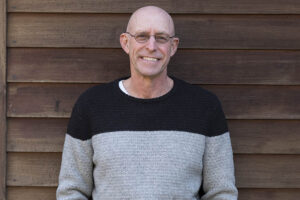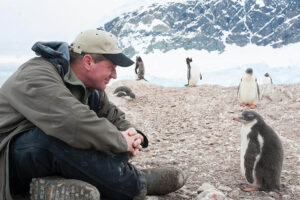Everyone from Socrates to Eminem has weighed in on the concept of truth: what it is, whether it exists, how and where to find it, and in this era of bots and big data, whether truth can ever be known.
The search for knowledge is the raison d’etre of academic institutions; at Washington University in St. Louis, even the school motto reflects it: “per veritatem vis,” which is Latin for “strength through truth.”
Since its first programs debuted more than six decades ago, the Assembly Series, the university’s premier lecture series, has strived to present programs that complement the vital intellectual enterprise of the institution.
This spring, the series brings experts to campus who will shed light on some of society’s most vexing issues. The six programs will explore: new approaches to coping with mental illness; showing how a plurality of perspectives benefits scientific progress; putting the “just” back into the criminal justice system; understanding the disastrous impact of species extinction; moving the #MeToo Movement forward; and finally, addressing the insidious “fake news” culture.
Many events also offer opportunities to interact with speakers via receptions, book signings and informal discussions on campus.
The following is the spring semester 2019 Assembly Series schedule; new programs may be added later. To receive up-to-date information or special instructions on specific events, visit the Assembly Series website or call 314-935-4620.
5:30 p.m. Feb. 21, Graham Chapel
Michael Pollan: “How to Change your Mind”
Note: Due to anticipated large turnout, seating for the public will be limited. Doors open at 4:30 p.m.

Michael Pollan is not a wild and crazy guy. He did not embrace the drug-addled youth culture of the ’60s and ’70s. He is well known and admired for his sound approaches to imbibing food that is natural and good for you.
So it may come as a surprise that his eighth book is not a guide for eating sustainably or wisely. Rather, it’s a personal and scientific exploration of the potential benefits of psychedelic drugs such as LSD and mushrooms. Decades ago, these once legal hallucinogenic drugs got a bad rap from their association with hippie youth culture, but now they are showing great promise in treating addiction, anxiety, depression and more.
Pollan doesn’t dismiss the potential danger of dropping acid. Rather, he calls for a new understanding of the healing properties of psychedelics and a return to conducting research on hallucinogenic drugs to treat serious mental disorders.
This is a Science Matters Lecture; a reception and book signing will follow.
4 p.m. March 19, McDonnell Hall, Room 162
Helen Longino: “Interdependence”
Diversity and inclusion are not new ideas to Stanford University philosopher Helen Longino. She has long argued that scientific progress is dependent upon a plurality of perspectives; that when inquiry is open to disparate points of view, it’s more open to critical analysis and thus more objective.
Throughout America’s turbulent social movements of the 1960s and ’70s, Longino helped lead the charge in advancing women’s studies programs. Equally important has been her pioneering advocacy and critical contributions for increasing the quality and quantity of female intellectual discourse in the male-dominated discipline of philosophy.
This is the annual Thomas Hall Lecture in History of Science.
3 p.m. March 27, Anheuser-Busch Hall, Room 310
Presentation and panel: “Prosecutorial Power in Transforming the Criminal Justice System”
Across the political spectrum, consensus is building for the need to reform America’s criminal justice system. Prosecutors are being called upon to address the vicious cycle known as the “cradle-to-prison” pipeline.
One of its most ardent and articulate apostles is Adam Foss, a former assistant prosecutor for Suffolk County, Mass., and now founder and president of the nonprofit organization Prosecutor Impact.
In his popular TED talk and through his organization, Foss demonstrates that alternative measures to locking up nonviolent offenders are more effective than incarceration for decreasing the recidivism rate and increasing positive outcomes for the offenders as well as for the victims and the communities in which they live.
Following his talk, Foss will join Jean Peters Baker, Jackson County, Mo., prosecutor; Wesley Bell, St. Louis County prosecutor; and Kim Gardner, St. Louis city circuit attorney, for a discussion on how they are working to put justice back in the criminal justice system.
The School of Law, the Brown School and the Clark-Fox Policy Institute are sponsoring the event.
5:30 p.m. April 1, Hillman Hall, Clark-Fox Forum
Joel Sartore: “Portraits from the Brink: The Critical Need to Document Biodiversity”
Currently, the planet is experiencing the worst spate of species die-offs since the loss of the dinosaurs 65 million years ago. In other words, we have entered the sixth mass extinction, but unlike its five predecessors, this one is largely human-driven.

But hope remains as more people become invested in saving precious but endangered species. People such as acclaimed National Geographic Society photographer Sartore, who has devoted his career to photographing endangered species and archiving the images in his “Photo Ark.”
Sartore will deliver the keynote presentation, followed by a conversation with Jonathan Losos, the William H. Danforth Professor of Biology in Arts & Sciences, and Saint Louis Zoo director Jeffrey Bonner. Losos and Bonner are members of the Living Earth Collaborative, an academic initiative dedicated to finding solutions to stem the loss of vast populations of flora and fauna.
This is a Science Matters Lecture, co-sponsored by the Living Earth Collaborative; a reception will follow.
6 p.m. April 9, Graham Chapel
Jessica Valenti: “Yes Means Yes: Envisioning an End to Interpersonal Violence”
Feminism is making a comeback, led by courageous women who have remained in the trenches, trying to erase the misconceptions that feminists are just sad man haters and trying to wipe out the misogyny embedded in American culture.
One such feminist leader is the best-selling author and popular feministing.com blogger Valenti. Writing honestly about her experiences, she is shining a light on the large and small ways that females are exposed to harassment, objectification and sexual violence.
April is Sexual Assault Awareness Month at Washington University. This lecture is sponsored by the student organization LIVE (Leaders in Interpersonal Violence Education) and supported by Student Union; and co-sponsored by the Woman’s Club of Washington University. A reception and book signing will follow.
5:30 p.m. April 17, Knight Hall, Emerson Auditorium
Presentation and panel: “The Fake News Cycle: Searching for Truth in the Digital Age”
While the creation and distribution of fake news is an old as American journalism, never before has it been so pervasive or influential. From Russian internet hackers interfering with the presidential election to President Trump’s repeated use of the term “fake news” to video tampering, these are aspects of a trend that is threatening a vital form of democracy.
Michael Barbaro, host of the popular political podcast “The Daily” and veteran reporter for The New York Times, will open the program with an overview of the profession and insights about its future.
A panel will follow, concentrating on the issues and challenges that the proliferation of fake news and misinformation create. Panelists include: Anna Banchik, a social media platforms expert who also studies human rights investigations; Sarah Kliff, a Washington University alumna, Vox correspondent and health-care expert; Becca Lewis, an internet scholar and fact-checking analyst with Data & Society; and moderator Sabrina Wang, a senior in Arts & Sciences and executive director of Washington University Political Review.
This is the Elliot Stein Lecture in Ethics, co-sponsored by Washington University Political Review, Student Life, and the Weidenbaum Center on the Economy, Government, and Public Policy in Arts & Sciences.
Comments and respectful dialogue are encouraged, but content will be moderated. Please, no personal attacks, obscenity or profanity, selling of commercial products, or endorsements of political candidates or positions. We reserve the right to remove any inappropriate comments. We also cannot address individual medical concerns or provide medical advice in this forum.